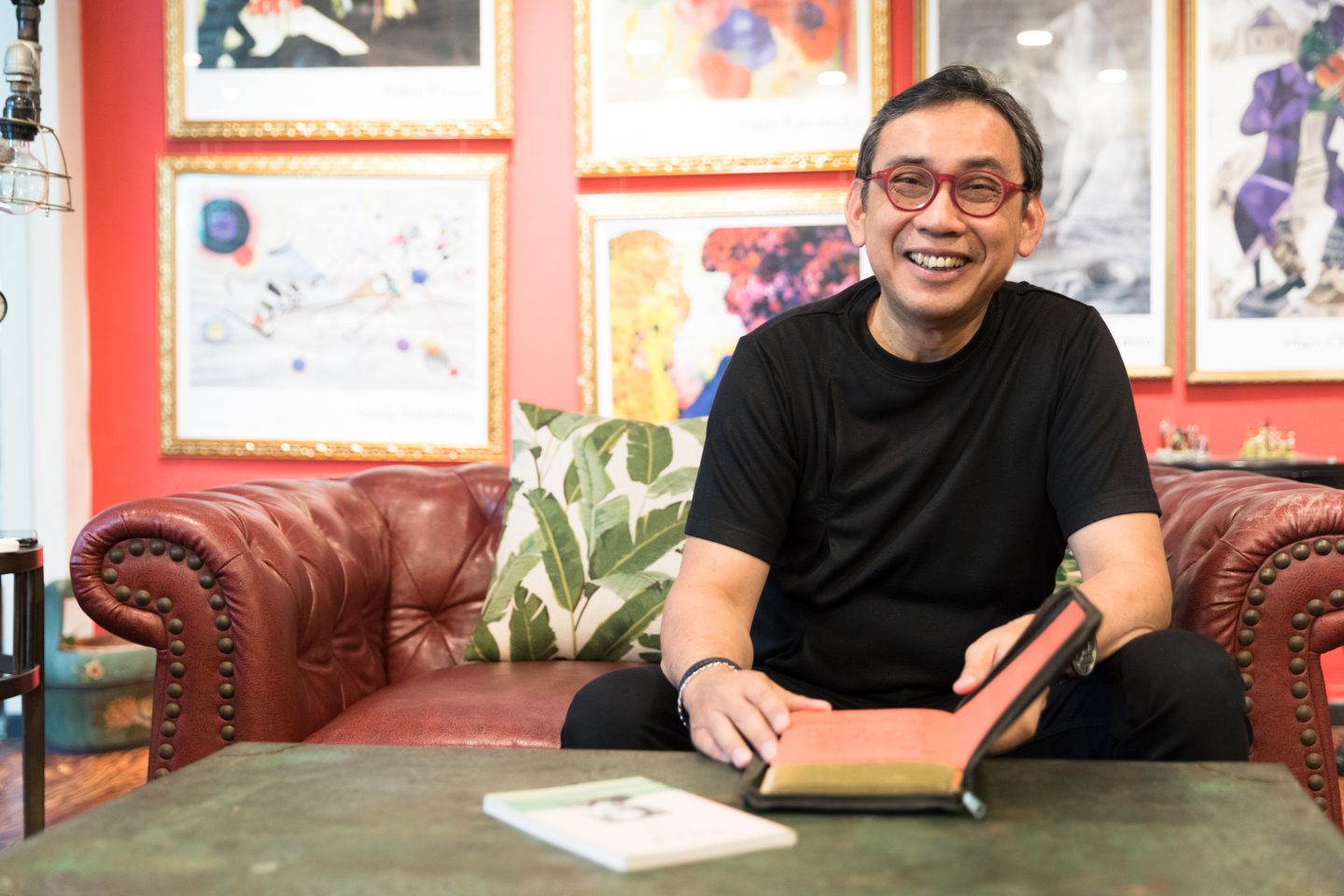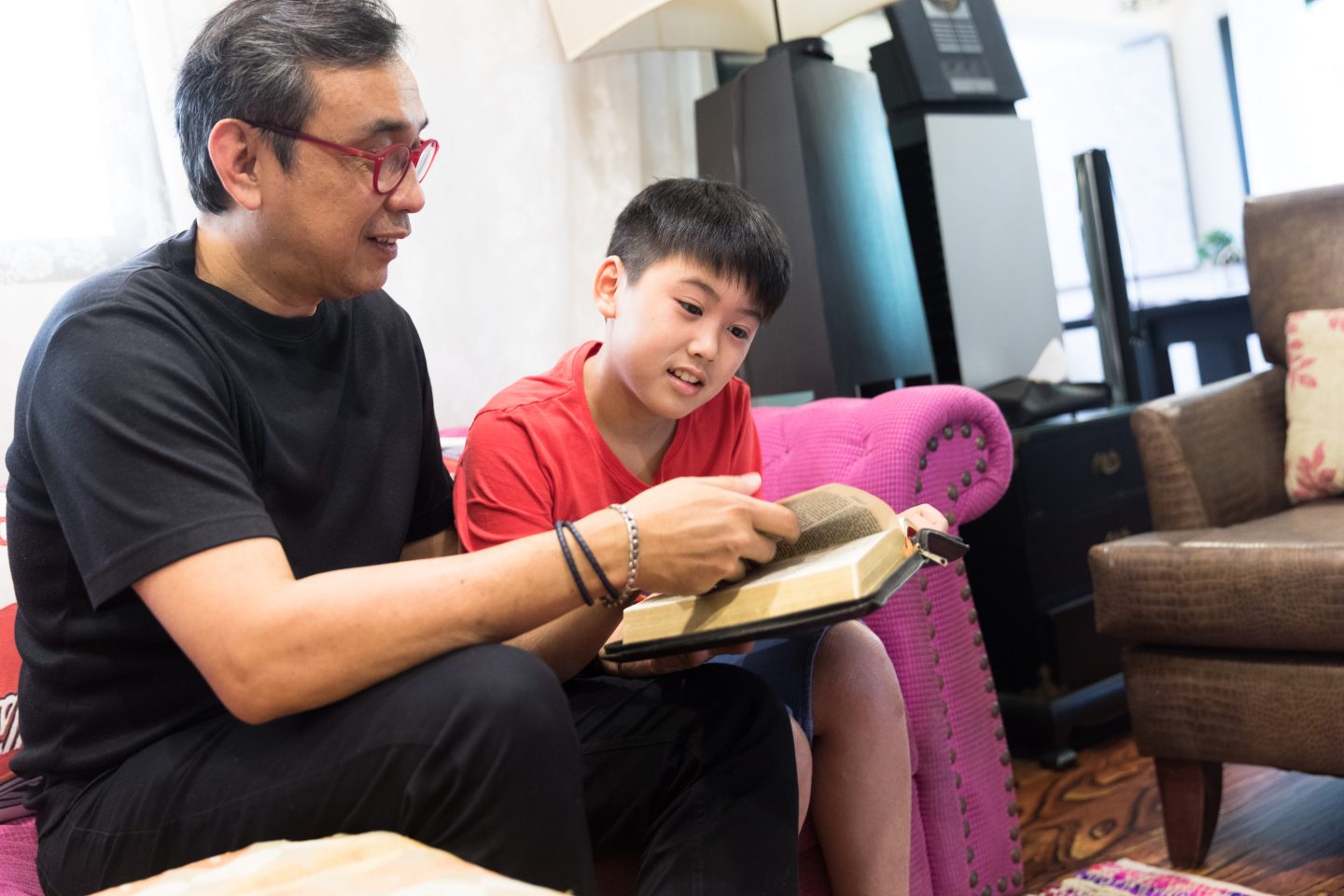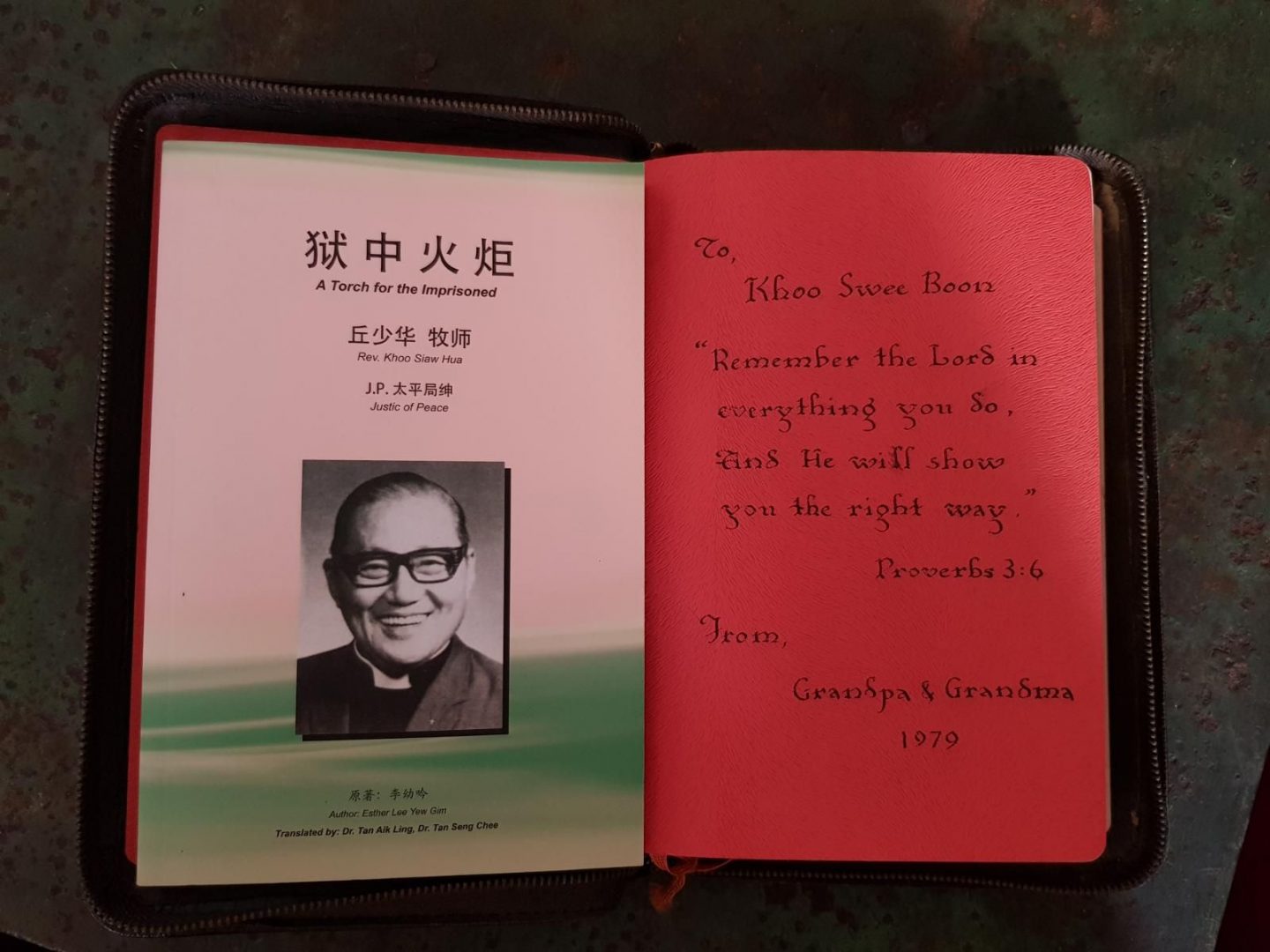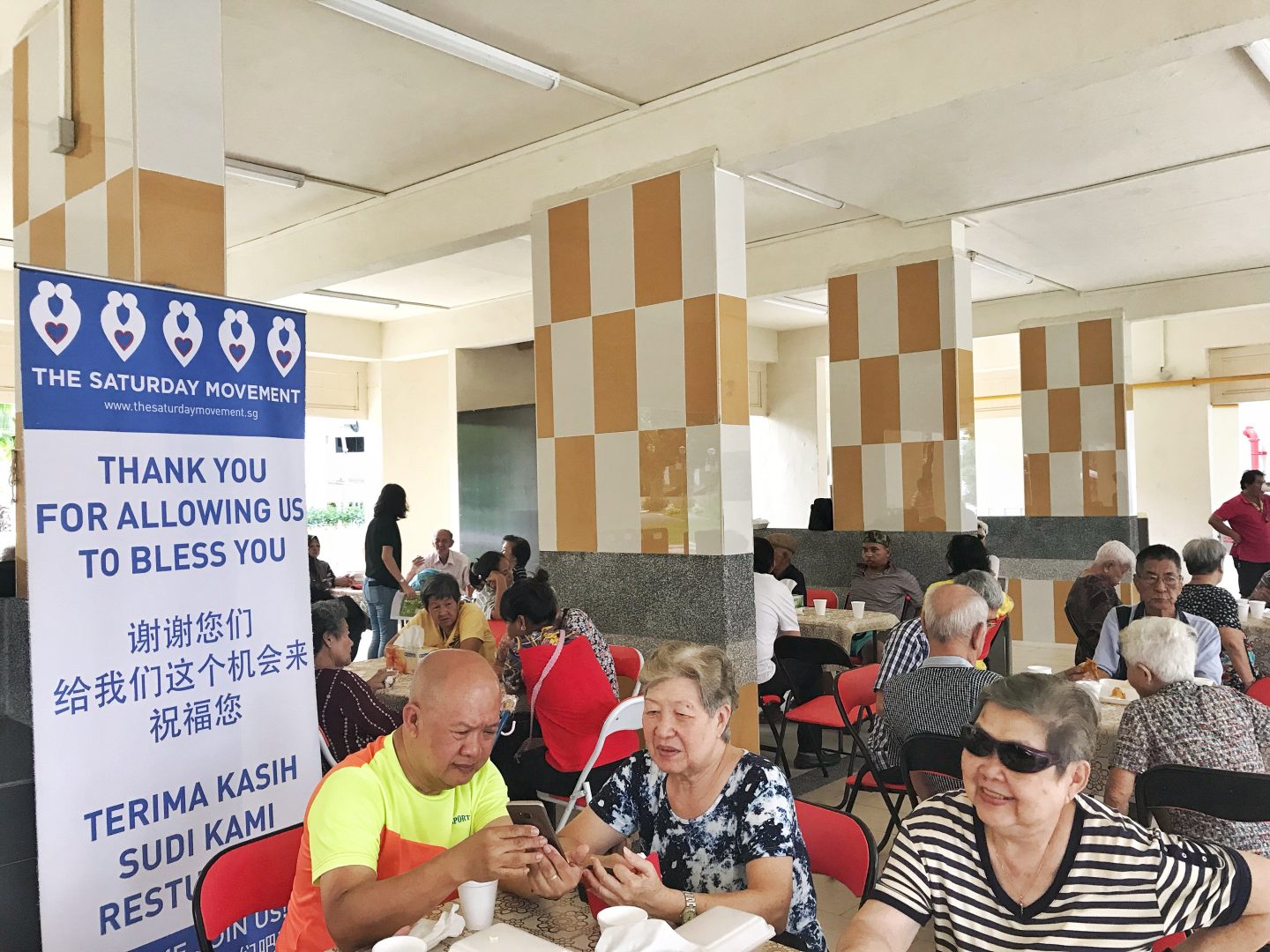The Peranakan’s Raymond Khoo loves his neighbours with belacan and pineapple tarts
by Rachel Phua // April 14, 2018, 12:27 am

Despite suffering losses of 80%, Raymond Khoo, the executive chef-owner of The Peranakan is ploughing in more money to support the elderly in Lengkok Bahru as well as healthcare workers during this difficult time. Photo by David Lawrence Lim.
It’s Saturday noontime at a void deck in Block 52 Lengkok Bahru.
About 50 people, mostly grey-haired, are having their lunch on makeshift tables. Some silently savour their lunch, which consists of a box of mee siam and chicken wings. Others chat with their equally sun-weathered neighbours over a cup of barley water, routinely refilled by eager volunteers.
The granny I’m sitting next to suddenly perks up, wheezing in Mandarin: “The boss is here.”
Saturdays@Lengkok Bahru doesn’t just provide a meal. There’s belacan and pineapple tarts. Buffets and lucky draws. Haircuts and home visits.
He’s no celebrity, but Raymond Khoo is treated like one at this corner of Redhill when he arrives. The lanky 55-year-old started an initiative called Saturdays@Lengkok Bahru here seven years ago.
Whenever Khoo is standing within earshot, an elderly resident would gush about how wonderful a man he is.
Saturdays doesn’t just provide a meal. There’s bread and fruit to take home after each session. Belacan and Peranakan desserts like pineapple tarts, pulot enti kelapa and durian on occasion. Buffets and lucky draws on holidays like Chinese New Year and Christmas. Outings to Botanic Gardens and Changi Airport (a first for some). A ride to and from Hokkien service at Grace Assembly of God (Grace AOG) after lunch. Tuition for grandkids. Haircuts. Home visits till 4 o’clock for those who don’t turn up, alongside prayer for the desperate or open-minded few.
Khoo used to fork out his own money to fund each session when the programme was in its early stages, before Grace AOG took it up as one of its ministries in 2013.

Khoo’s son, Justin, 10, accompanies his dad to Lengkok Bahru every Saturday, delivering food and befriending the residents. Photo by David Lawrence Lim.
Saturdays with grandad
This isn’t Khoo’s first foray into philanthropy. In the 1990s, he was a volunteer at Renewal Centre and HighPoint Halfway House. He also helped set up a prison ministry at Grace AOG more than a decade ago.
When he opened The Peranakan in 2016, Khoo hired former inmates, wives of current felons and unemployed middle-aged people.
As a food and beverage businessman who brought in the Tong Shui franchise and runs his own lifestyle consultancy firm, Solutions 17, he would hire ex-convicts for the various restaurants he owned over the years, starting with Bay View Club, a Western-style establishment he ran in Malaysia after he moved to Malacca and then Kuala Lumpur.
When he opened the much-lauded restaurant The Peranakan on Singapore’s Orchard Road in 2016, Khoo hired a mixed-bag of former inmates, wives of current felons and unemployed middle-aged people who were struggling to find a job. The executive chef of the restaurant says it’s overstaffed, but he treats the decision as part of operating expenses.
Being Reverend Khoo Siaw Hua’s grandson could have something to do with his altruism.

A family heirloom: The bible gifted to Raymond by his grandfather, Singapore’s first prison chaplain Reverend Khoo Siaw Hua.
Khoo says he would stay with his granddad, the first prison chaplain of Singapore, every weekend in the elder Khoo’s spacious two-storey bungalow.
The youngest of four sons would see big men covered in tattoos sleeping on the first floor. Similarly colourful characters would appear on Saturday mornings when he followed his grandpa to Redhill Food Centre, then in a notorious area.
At first the kid was afraid, but then he saw these grown men hugging Reverend Khoo, asking to be prayed for, shouting “kam sia zhu” (Hokkien for “thank you, Jesus”) in the middle of the crowded market. And all desire to judge his fellow brothers left the young boy.
“They would give him a pig’s head, not to threaten him like what loan sharks use the pig’s head for today, but because he likes to eat that,” Khoo laughs. “I could see that they were transformed.”
Feeding those who “built Singapore”
Khoo and his family were taking part in his church’s food distribution drive around Christmas at Lengkok Bahru some years ago, where low-income Singaporeans stay in sparse one-room flats. They were taken aback by the level of poverty they were seeing, so much so that his wife couldn’t sleep for two nights.
He found out that the residents weren’t getting assistance regularly, apart from government aid, and decided to step in.
“Once a year makan (Malay for ‘eat’), go back, they forget about you until next year. How about the other 364 days?”
“Once a year makan, go back, they forget about you until next year. How about the other 364 days?”
This was the sudden thought that led Khoo to initiate Saturdays.
The first year was a test of his willpower. Getting a permit from the town council to run Saturdays was a bigger challenge than he thought, as he had to vow that he wasn’t there to talk about religion or politics.
When he went door-to-door with invites, residents were suspicious of Khoo’s intentions, and they tried to shake him off. He prayed for God’s favour over the ministry with Zechariah 2:5: “‘And I myself will be a wall of fire around it,’ declares the Lord, ‘and I will be its glory within.'”
“I didn’t know what I was getting into,” admits Khoo wryly.
“I thought if you provide food, everybody would come. But they were very apprehensive. They would ask, ‘Who are you? Why are you here? Are you from the temple? From church? Cannot take my IC!’”
He assured them that it was just his way of giving back to people who “built Singapore”. Yet even after they came, the folks were still unhappy, complaining about the food – “Why not enough to eat”, “Why my fish got bone?” And Khoo had to rely on volunteers with iffy commitment levels to appease them.

A typical Saturday afternoon at Block 52 Lengkok Bahru. Photo by Rachel Phua.
Food was what kept the social advocate from giving up. Every time he ate, Khoo was “super thankful”, he says. At least he was guaranteed a meal. The elderly poor “don’t know when theirs is coming, or if it’s even coming or not”.
“They will call me if I forget to come down,” says Saturdays‘ beneficiary Perumal Letchmi, 73, affirming the team’s hard work. “And if I don’t, they will bring [the food] up to my place.”
Khoo doesn’t want to see his new friends leave the world “bitter and angry” in their last days (eight to 10 beneficiaries die every year). Most of them have been abandoned by their children, or worse, they commit suicide, says Khoo, as he talks about the rising elderly suicide rate in Singapore.
They are sharing the gospel with their neighbours and some share their testimony saying, “I was so unhappy. But I’m not so angry anymore.”
According to a July 2017 press release published by the Samaritans of Singapore, suicides among adults aged 50 and above made up 46% of the 429 suicide deaths recorded in 2016.
He believes they should depart with their cravings satisfied, stories heard, and memories of new friends made.
“Before Saturdays, they knew each other, but they never interacted. Now, they can be standing at the market and chit-chatting for half an hour. [Or when] they go to the polyclinic, they try to go on the same day and take the taxi together,” says Khoo.
As for those who started going to church, “they are sharing the gospel with their neighbours. [And some have] even shared their testimony in church, ‘I was so unhappy and unforgiving. [Now] I still feel sad sometimes…but I’m not so angry anymore’.”
Even those who aren’t Christians tag along to church sometimes. One 85-year-old beneficiary, who only wants to be known as Mr Tan, says in Mandarin that it’s much better than staying at home.
“I feel happy listening to the worship songs, mingling with others.”
As for Saturdays, Mr Tan says: “Even one meal is a large expense, so this means a lot to me.”
https://www.facebook.com/saturdaysatlengkokbahru/videos/1641404332619774/
Spirit filled
Though ministry work and social justice have always been a natural part of Khoo’s life, faith wasn’t. Granted, he diligently went to Sunday school well into his teens. He continued helping his granddad with prison ministry work until he entered national service, bringing eggs to prison every Easter and distributing gifts every Christmas.
But he stopped going to church when he moved to Malaysia in the 1980s after national service, only attending service again when he moved back to Singapore for the second time in the late 1990s.
It wasn’t until just two years ago that Khoo took Christianity seriously, he says, after witnessing what truly knowing the love of Jesus can do to a person.
One of his brothers was struck with cancer and had only two-and-a-half months left to live.
“We must touch lives, that the residents will know Jesus touched us, which is why we are able to love them through our actions.”
His brother was once into all sorts of vices, Khoo says. Smoking. gambling. He never set foot into a church as an adult, save for another brother’s wedding. After some time, his brother felt too ashamed to return to church.
There he was, living his last days in a hospice, and Khoo had “dropped everything” to spend 15 hours every day by his side.
“We spent a lot of time sharing our lives, talking about the meaning of life,” he recalls.
Khoo says his brother would start hallucinating during his afternoon naps, shouting: “Don’t take me, don’t take me.” or “Are you Jesus? I’ll only go with Jesus.”
Khoo remembers: “In his last days, he could hardly eat but he could lift his hands for 15 minutes just to worship God. Everybody was shocked. Uncles. Pastors. They never expected him to be so gracious and so full of love for Jesus.
“Everybody could see that he was so Spirit-filled. He said, ‘Jesus loves me. Jesus loves me. I have been forgiven and I forgive everybody.'”
When Khoo was upset by a family matter, it was his brother that told him to forgive the people involved.
“He was ministering to me so much. That was my turning point. When you see his transformation, you go wow, Jesus is real.”
God loves His people, no matter how broken and condemned by man, Khoo believes, and he wants to share this knowledge with others (1 John 4:7-12, 19).
“I tell my Saturdays team leaders: We must touch lives, that the residents will know Jesus touched us, which is why we are able to love them through our actions.”
He intends to open a soup kitchen by the end of this year that will provide one meal a day to Lengkok Bahru’s needy residents as well. He even hopes that restaurants in Singapore can contribute “something special” once a week.
He hopes Singaporeans will “step up and contribute” when the time comes, citing what Jesus said in Matthew 9:17.
“You’ll just be carrying stagnant water if you remain an old vase. Break yourself, mend yourself, and be filled again with fresh water.”
If you feel led to help out with Saturdays@Lengkok Bahru, please email [email protected]
We are an independent, non-profit organisation that relies on the generosity of our readers, such as yourself, to continue serving the kingdom. Every dollar donated goes directly back into our editorial coverage.
Would you consider partnering with us in our kingdom work by supporting us financially, either as a one-off donation, or a recurring pledge?
Support Salt&Light


